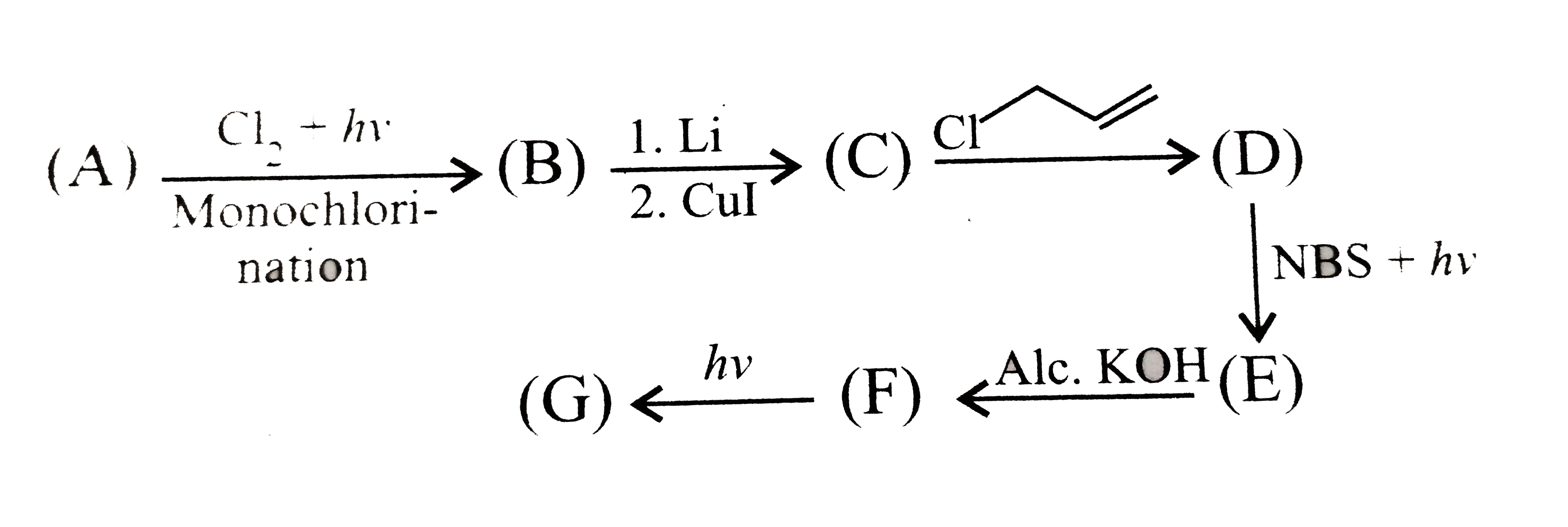A gaseous hydrocarbon consumed 5 times its volume of oxygen as for combustion. The volume of CO2 produced in the reaction is thrice the volume of hydrocarbon under the same conditions
What is the ratio of molecular weight to emperical formula weight of the hydrocarbon?
1
2
3
4
The correct Answer is:A
To solve the problem, we need to determine the ratio of the molecular weight to the empirical formula weight of the hydrocarbon based on the information provided about its combustion.
1. Understanding the Combustion Reaction:
The general combustion reaction for a hydrocarbon (CₓHᵧ) can be represented as:
CxHy+x+y41O2→xCO2+y2H2O
2. Setting Up the Volumes:
According to the problem:
- The volume of the hydrocarbon (let's assume it is 1 unit) is VCxHy=1.
- The volume of oxygen consumed is 5 times the volume of the hydrocarbon, so:
VO2=5×VCxHy=5 units
- The volume of carbon dioxide produced is three times the volume of the hydrocarbon:
VCO2=3×VCxHy=3 units
3. Identifying Variables:
From the combustion reaction:
- The volume of CO2 produced corresponds to x (the number of carbon atoms).
- Therefore, x=3.
4. Using the Oxygen Volume:
The volume of oxygen consumed can be expressed in terms of x and y:
x+y41=5
Substituting x=3:
3+y4=5
5. Solving for y:
Rearranging the equation:
y4=5−3=2
Multiplying both sides by 4:
y=8
6. Determining the Molecular Formula:
The molecular formula of the hydrocarbon is:
C3H8
7. Calculating the Molecular Weight:
The molecular weight of C3H8:
- Carbon (C) has a molar mass of approximately 12 g/mol.
- Hydrogen (H) has a molar mass of approximately 1 g/mol.
Molecular Weight=(3×12)+(8×1)=36+8=44 g/mol
8. Calculating the Empirical Formula Weight:
The empirical formula of the hydrocarbon is also C3H8 (since it is already in its simplest form).
Empirical Formula Weight=44 g/mol
9. Finding the Ratio:
The ratio of molecular weight to empirical formula weight is:
Ratio=Molecular WeightEmpirical Formula Weight=4444=1
Final Answer:
The ratio of molecular weight to empirical formula weight of the hydrocarbon is 1.
The general combustion reaction for a hydrocarbon (CₓHᵧ) can be represented as:
CxHy+x+y41O2→xCO2+y2H2O
According to the problem:
- The volume of the hydrocarbon (let's assume it is 1 unit) is VCxHy=1.
- The volume of oxygen consumed is 5 times the volume of the hydrocarbon, so:
VO2=5×VCxHy=5 units
- The volume of carbon dioxide produced is three times the volume of the hydrocarbon:
VCO2=3×VCxHy=3 units
From the combustion reaction:
- The volume of CO2 produced corresponds to x (the number of carbon atoms).
- Therefore, x=3.
The volume of oxygen consumed can be expressed in terms of x and y:
x+y41=5
Substituting x=3:
3+y4=5
Rearranging the equation:
y4=5−3=2
Multiplying both sides by 4:
y=8
The molecular formula of the hydrocarbon is:
C3H8
The molecular weight of C3H8:
- Carbon (C) has a molar mass of approximately 12 g/mol.
- Hydrogen (H) has a molar mass of approximately 1 g/mol.
Molecular Weight=(3×12)+(8×1)=36+8=44 g/mol
The empirical formula of the hydrocarbon is also C3H8 (since it is already in its simplest form).
Empirical Formula Weight=44 g/mol
The ratio of molecular weight to empirical formula weight is:
Ratio=Molecular WeightEmpirical Formula Weight=4444=1
The ratio of molecular weight to empirical formula weight of the hydrocarbon is 1.
Similar Questions
A gaseous hydrocarbon consumed 5 times its volume of oxygen as for combustion. The volume of CO2 produced in the reaction is thrice the volume of hydrocarbon under the same conditions
How many grams of water is produced by combustion of 0.1 mol of the givenn hydrocarbon?
View Solution10 mL of a certain hydrocarbon require 25 mL of oxygen for complete combustion and the volume CO2 of product is 20 mL. What is the formula of hydrocarbon ?
View Solution10 ml of hydrocarbon requries 55 ml of oxygen for complete combustion producing 40 ml of CO2. The formula of the hydrocarbon is:
View SolutionAir contains 20% by volume of oxygen. The volume of air required for the compoete combustion of 1L of methane under the same conditions is
View SolutionTwenty millilitres of a gaseous hydrocarbon (A) was exploded with excess of oxygen in eudiometer tube. On cooling, the volume was reduced by 50ml. On further treatement with KOH solution, there was a further contraction of 40 ml.

The molecular formula of the hydrocarbon (A) is:
View SolutionA gaseous hydrocarbon gives upon combustion, 0.72 g of water and 3.08 g of CO2. The empirical formula of the hydrocarbon is
View Solution50 ml of oxygen diffuses under certain conditions through a porous membrane. The volume of Hydrogen that diffuses in the same time under the same conditions is
View SolutionA gaseous paraffin requires five times its volume of oxygen for complete combustion. How many carbon atoms are present in a molecule of that paraffin?
View SolutionVolume of O2 gas produced on electrolysis of dil. H2SO4 is 1120 mL The volume of H2 produced in the same time is under identical conditions is
View SolutionAt STP 16 mL of O2 diffused through a porous partition in t seconds. What volume of CO2 will diffuse in the same time and under the same conditions?
View Solution
